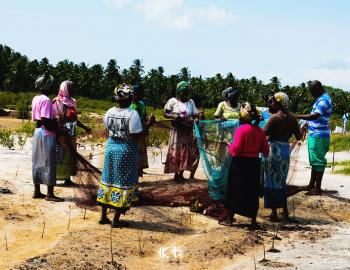‘Gender lens’: the approach that low-carbon businesses cannot do without
‘Gender lens’: the approach that low-carbon businesses cannot do without
Entirely new climate-smart technologies and innovations in production systems are emerging in response to the climate emergency. Other climate-smart technologies, such as solar photovoltaic (PV) systems, are already established at scale and are further extending their market penetration in developing countries.
New evidence from the Gender Equality in a Low Carbon World (GLOW) programme makes the case that climate-smart businesses innovating in this low-carbon, climate-resilient space require a gender lens approach to meet their full potential for economic sustainability and positive climate impact.
The term ‘gender lens’ describes business structures, policies and measures that, in varying combinations:
- identify differential barriers women face and ways to reduce them
- enable women to be highly effective as private-sector leaders and entrepreneurs
- ensure that women secure decent work as employees or can participate successfully in
higher-value economic activities
- enable the benefits of private sector entities to be accessible and meaningful to women.
This policy brief is for entrepreneurs of low-carbon, climate-resilient businesses in developing countries and for the public sector financiers and impact investors positioned to support them.
The brief summarises findings from small and medium enterprises (SMEs) innovating low-carbon, climate-resilient technologies and practices in agriculture, aquaculture and related value chains. It illustrates how SME leaders can strengthen their capacity for and application of gender lens approaches as a way of consolidating business viability and sustainability. Impact investors have a role in deepening this capacity.
Gender lens and women’s empowerment approaches are not just fair – they are successful strategies for climate-smart businesses.
If you liked this policy brief, you may also enjoy our related 3-minute film and our interactive, flagship report with case studies, Empowering Women in Just Transitions: Insights from the GLOW programme.
Image (above): Kenyan practitioner of Integrated Multi-Trophic Aquaculture (IMTA), a highly efficient and climate-smart system.



